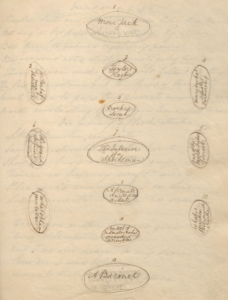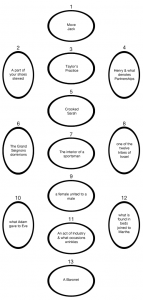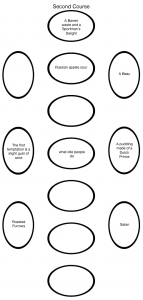By Nathalie Cooke, Professor and Associate Dean, Archives & Rare Collections, McGill University Library
Thanks to all who took up our riddling challenge offering answers from across Canada and abroad (including England, Ireland, and New Zealand). We promised to provide some answers and here they are!
Earlier this summer, we asked readers to solve table setting riddles penned by Eliza Smithson in 1804 in one of the manuscripts from Doncaster, England, held in McGill’s Rare and Special Collections. In the place of the name of a dish, Smithson provides only riddling clues. Puzzle me this: What was she imagining she might serve for the first and second courses of her dinner? More than 200 years later, thanks to crowdsourcing, we can suggest some excellent answers. Look below for images of her table diagrams, as well as transcriptions and proposed solutions.
Look for more table settting’ or ‘bill of fare’ riddles shortly, and please send any further suggestions to the comments field or email info.library@mcgill.ca. With congratulations to Elizabeth Thomson for winning the bookstore coupon; and with honorable mention all those talented riddlers whose names appear here beside their solutions!
Solutions
Move Jack
- A roasting jack (Judith Flanders, Dorothy Cashman)
- A spit roast (Helen Leach)
- Sturgeon (-> stir John -> sturgeon) (Elizabeth Thomson)
A part of your shoes stewed
- Stewed Sole (Cashman, Sarah Hood, Leach, Thomson, Barceny Wodehouse)
- Tongue (Kay Elčić, Wodehouse)
Taylor’s Practice
- Dressing (Thomson)
- Cabbage (Leach, and one 1834 Doncaster manuscript source)
Henry and what denotes Partnerships
- -> Harry Co. -> haricots (green beans) (Thomson)
- harrico[t] of mutton (Cashman, Leach)
Crooked Sarah
- celery, sometimes listed as Crooked Sarah in a Passion, which is stewed celery! (American Antiquarian Society)
- lamb, the notorious Sarah Malcolm committed murder in the Lamb Building in the Temple, London (Leach)
- -> a wry Sall -> rissoles (Thomson, who admits this might be a stretch!)
The Grand Seignoirs dominions
- ‘Grand Seignoir’ from OED is Sultan, so -> sultanas (Thomson)
- The Grand Seigneur was none other than the Sultan of Turkey. Guess our holiday palates have not changed as much as one might think! (Ivan Day)
- Also suggesting turkey (Leach and one Doncaster source)
The interior of a sportsman
- Port (Thomson)
- Flemters’s Puddings (one historical Doncaster manuscript source)
- Hunters’ pudding (Leach)
One of the twelve tribes of Israel
- Simeon -> salmon, or some way of turning Naphtali into napery? (Flanders)
- A bad pun for Ribband (calf’s foot jelly), got from Reuben? Or ‘Benshamelle Sauce’: (see Mollard & Farley), from Benjamin? (Sarah Hood)
- [Genesis 49:21]: “Naftali is a swift deer.” (Anna Dysert)
- [Genesis 49:20]: “From Asher will be his rich bread.” (Dysert)
- Isachaar: Issachar -> Is a char. Here’s a recipe for potted char from the Housekeeper’s Instructor; or, Universal Family Cook by W.A. Henderson (1807). https://janeaustenslondon.com/tag/potted-char/ (Thomson)
A female united to a male
- Alewife (Hood)
- Salad – one Doncaster source and Thomson, who offers an explanation: -> Sal+Lad -> salad
What Adam gave to Eve
- Ribs or a Spare Rib (Hood, Leach, Thomson)
An act of industry and what occasions wrinkles
- Spinach (-> spin+age -> spinach) Thomson; or ‘Spenage’ (from one historical Doncaster manuscript source)
- Potage (Leach)
What is found in beds joined to Martha
- Oyster+? (Hood)
- Oyster patties (-> oysters+Patsy -> Oyster patties) Thomson
A Baronet
- Sir Loin (Leach, Thomson)
Second Course Solutions
A Barren waste and a Sportman’s Delight
- Moor game – John Farley, London Art of Cookery has a recipe for Potted Moor Game (Hood)
Russian apples sour
- Apple tart made from Emperor Alexander apples (Cashman)
- Antonovka apples, or brined apples (Darra Goldstein)
- Pickled beets (Sylvia Lovegren)
- Tart (Leach)
A Beau
- Macaroni – “Macaroni pudding was a recipe of the time.” (Cashman)
- Matrimony (Cashman)
The first temptation & a slight gust of wind
- Apple puffs – “I’ve found apple dessert recipes from the Regency era referred to as ‘Apple Puffs’ in modern sources, but I’ve found no proof so far that they were actually called ‘puffs’ during that era.” (Thomson)
- “I’ve been thinking about this, and “puff” seems closer to “slight gust of wind” than “flurry” does.” http://toriavey.com/toris-kitchen/2014/03/jane-austen-apple-puffs/” (Hood)
- “Apple flurry puff or flan: a flurry of wind in apple blossom time.” (Elka Weinstein)
- “There also seems to be something called an “Apple breeze” although it’s decidedly cocktail-like and I can’t find any historical context.” (Andrew Senior)
What Idle people do
- Lark (Hood)
- Root vegetable – “Idleness is the root of mischief.” (Sheila Ratcliffe)
- Loaf (Leach)
A Pudding made of a Dutch Prince
- Orange custard – “…as in William of Orange.” (Mark D’Aguilar)
- Orange Pudding – “There’s an orange pudding mentioned in “The Young Housewife’s Counsellor and Friend.” http://docsouth.unc.edu/nc/mason/mason.html#p15 (Leach and Senior)
Roasted Furrows
- Furrows = rows = rosé. Mulled rosé or wine? (Ratcliffe)
- Roasted pullets [see Samuel Johnston’s Dictionary, where one form of furrow is called a pulley, cf French poulet]. (Leach)
Satan
- Deviled eggs (Lauren Goldman)
- Syllabub as in, Satan = Beelzebub = syllabub (Ratcliffe and Thomson)
- “I did discover that early chocolates were referred to as diablotins.” (Thomson)
- “Deviled kidneys were very popular at breakfast in the 1900s, but deviled meat, such as lamb or mutton was certainly around in the 1800s. Pepper, mustard, cayenne, etc.” (Weinstein)



















Leave a Reply
You must be logged in to post a comment.